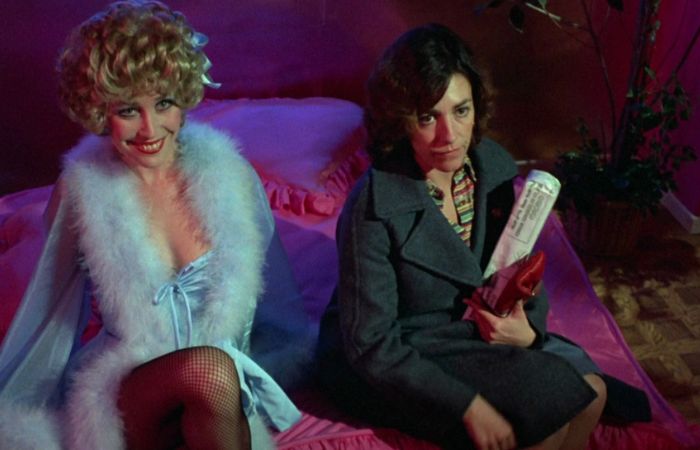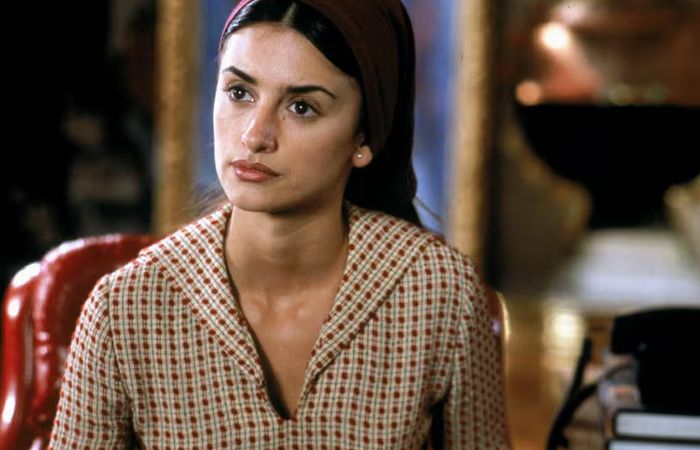
Blog
Pedro Almodóvar, the internationally acclaimed Spanish filmmaker, has left an indelible mark on cinema with his distinctive style and storytelling prowess. Since his debut in the early 1980s, Almodóvar has enchanted audiences worldwide with his bold narratives, vibrant visuals, and complex characters. In this blog post, we embark on a journey through some of his most notable works, exploring what makes each film a masterpiece in its own right.
Who is Pedro Almodóvar? More About His Story

The “Almodóvar phenomenon” has reached all over the world, making his films very popular in many countries.The most internationally acclaimed Spanish filmmaker since Luis Buñuel was born in a small town (Calzada de Calatrava) in the impoverished Spanish region of La Mancha. He arrived in Madrid in 1968, and survived by selling used items in the flea-market called El Rastro. Almodóvar couldn’t study filmmaking because he didn’t have the money to afford it. Besides, the filmmaking schools were closed in the early 70s by Franco’s government. Instead, he found a job in a Spanish phone company and saved his salary to buy a Super 8 camera.
From 1972 to 1978, he devoted himself to making short films with the help of his friends. The “premieres” of those early films were famous in the rapidly growing world of the Spanish counter-culture. In just a few years, Almodóvar became a star of “La Movida”, the pop cultural movement of late 70s Madrid. His first feature film, Pepi, Luci, Bom and Other Girls Like Mom (1980), was made in 16 mm and blown-up to 35 mm for public release. In 1987, he and his brother Agustín Almodóvar established their own production company: El Deseo, S. A.
The Best Pedro Almodóvar Movies to Watch
Pedro Almodóvar’s filmography is a tapestry of genres, emotions, and narratives that reflect his unique perspective on life, love, Spanish counter culture, and society. Almodóvar plays by his own rules, and that was always evident. Let’s delve into a brief description of each movie, highlighting their individual uniqueness:
1. Pepi, Luci, Bom and Other Girls on the Heap (1980)

Pepi, Luci, Bom (Spanish: Pepi, Luci, Bom y otras chicas del montón) is the first feature film written and directed by Pedro Almodóvar. Starring Carmen Maura, Eva Siva, Alaska and Félix Rotaeta, the plot follows the wild adventures of three friends: Pepi, an independent modern woman; Luci, a mousy, masochistic housewife; and Bom, a lesbian punk rock singer.
2. Labyrinth of Passion (1982)
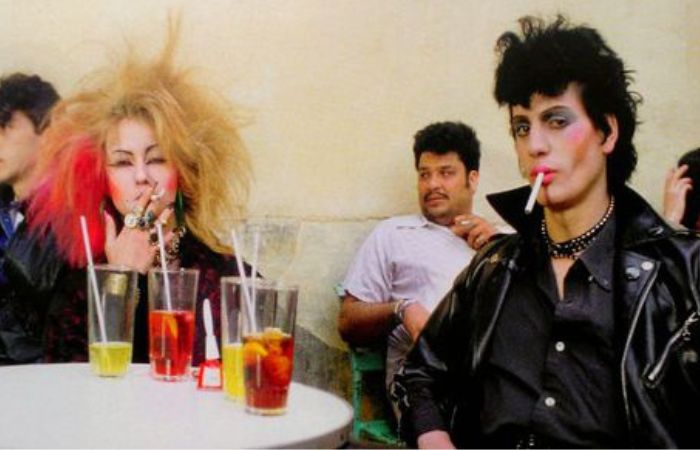
Labyrinth of Passion (Spanish: Laberinto de pasiones), written and directed by Pedro Almodóvar, starring Cecilia Roth and Imanol Arias, is a camp classic melodrama/comedy about Sexilia (a nymphomaniac), Sadec (a gay Islamic terrorist), Riza Niro (the son of the emperor of Tiran), and Queti (the daughter of a dry-cleaner). Their unlikely destiny is to find one another, overcome their sexual preferences and live happily ever after on a tropical island. The movie is an outrageous look at love and sex, framed in Madrid of the early 1980s, during the so-called Movida madrileña, a period of sexual adventurousness between the dissolution of Franco’s authoritarian regime and the onset of AIDS consciousness, and is considered a cult-classic of Almodóvar’s early films.
3. Dark Habits (1983)
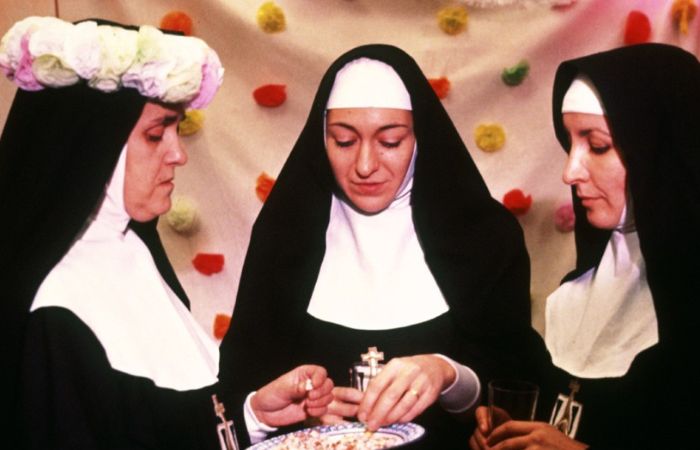
Dark Habits (Spanish: Entre Tinieblas) is a 1983 Spanish black comedy written and directed by Pedro Almodóvar and starring Julieta Serrano, Marisa Paredes and Chus Lampreave. The plot follows a cabaret singer who finds refuge in a convent of eccentric nuns, and is an exploration of the anachronistic situation of institutionalized religion in contemporary Spanish society.
4. What Have I Done to Deserve This? (1984)
What Have I Done to Deserve This? (Spanish: ¿Qué he hecho yo para merecer esto!) is a 1984 Spanish black comedy written and directed by Pedro Almodóvar. Starring Carmen Maura, Ángel de Andrés López, Chus Lampreave and Verónica Forqué, following the misadventures of an overworked housewife and her dysfunctional family. Almodóvar has described What Have I Done as a homage to Italian neorealism. Gloria is an impoverished housewife and cleaning lady, trapped in a loveless marriage, and her taxicab-driver husband is still pining for an old fling, but an argument between husband and wife then leads to mariticide.
5. Matador (1986)
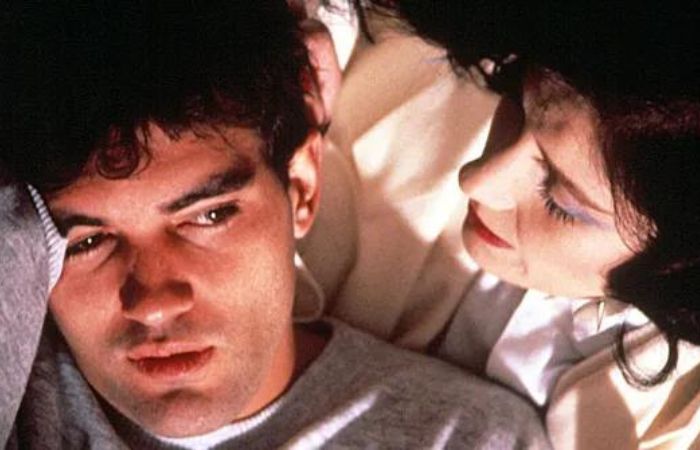
Matador is a 1986 Spanish erotic thriller co-written and directed by Pedro Almodóvar. Forced to retire after a goring, matador Diego Montez (Nacho Martínez) has since become a teacher. Among his students is Ángel (Antonio Banderas), a naive boy so perversely desperate to impress that he attempts to rape Diego’s girlfriend, Eva (Eva Cobo). He fails, but turns himself in regardless, also confessing to a series of murders he’s recently seen in psychic visions. A lawyer (Assumpta Serna) steps in to defend him, but the police are unconvinced Angel is the real culprit.
6. Law of Desire (1987)

Law of Desire (Spanish: La ley del deseo) is a 1987 Spanish comedy thriller written and directed by Pedro Almodóvar. Starring Eusebio Poncela as Pablo, Carmen Maura as Tina and Antonio Banderas as Antonio, it was the first film Almodóvar made independently with his own production company El Deseo. Almodóvar’s approach to plot was starting to cohere when he made this triangular romance about a gay director, his young lover and an obsessive fan (Banderas) who tips the drama into psychothriller territory. Shot in the later part of 1986, Law of Desire was Almodóvar’s first work centered on homosexual relationships. He considers Law of Desire the key film in his life and career, following the more serious tone set by Almodóvar’s previous movie, Matador, exploring the unrestrained force of desire.
7. Women on the Verge of a Nervous Breakdown (1988)
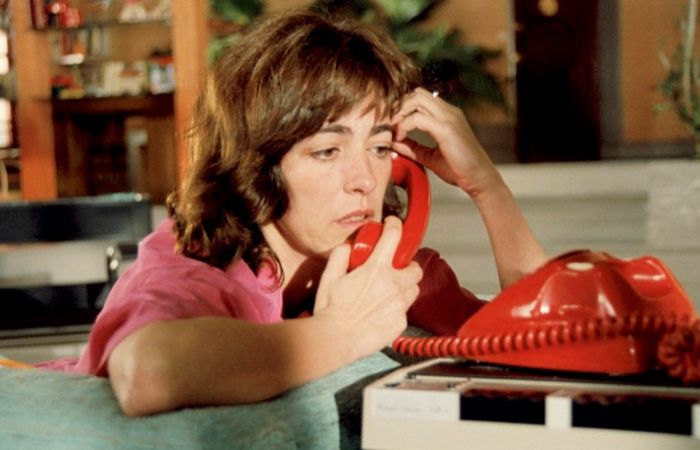
Women on the Verge of a Nervous Breakdown (Spanish: Mujeres al borde de un ataque de nervios) is a 1988 Spanish black comedy written and directed by Pedro Almodóvar, starring Carmen Maura, Antonio Banderas and Julieta Serrano. The plot follows actress Pepa, who, after her lover Iván leaves without explanation, sets out to find the reason, and comes across an array of eccentric characters. Women on the Verge of a Nervous Breakdown brought Almodóvar to widespread international attention and acclaim, including a nomination for the 1988 Academy Award for Best Foreign Language Film after debuting at the 45th Venice International Film Festival, and is considered to have launched Almodóvar’s career into the mainstream. A stage musical opened on Broadway in 2010, adapted by Jeffrey Lane with songs by David Yazbek.
8. Tie Me Up! Tie Me Down! (1989)

Tie Me Up! Tie Me Down! (Spanish: ¡Átame!, pronounced [ˈa.ta.me], “Tie Me!”) is a 1989 Spanish dark romantic comedy co-written and directed by Pedro Almodóvar, starring Victoria Abril and Antonio Banderas alongside Loles León, Francisco Rabal, Julieta Serrano, María Barranco, and Rossy de Palma. Newly released from a mental institution, Ricky (Banderas) heads straight for a reunion with the love of his life, B-movie actress Marina (Abril). The trouble is, Marina doesn’t remember him — or the fling they had during her years as a junkie and porn star. Determined to make Marina love him, Ricky barges into her apartment and ties her up. With a captive audience, Ricky is sure it’s only a matter of time before his beloved returns his affections.
9. High Heels (1991)

High Heels (Spanish: Tacones lejanos) is a 1991 melodrama written and directed by Pedro Almodóvar and starring Victoria Abril, Marisa Paredes and Miguel Bosé. The plot follows the fractured relationship between a self-involved mother, a famous torch singer, and her grown daughter she had abandoned as a child – until a murder further complicates this web of relationships. The film was selected as the Spanish entry for the Best Foreign Language Film at the 64th Academy Awards, but was not accepted as a nominee.
10. Kika (1993)
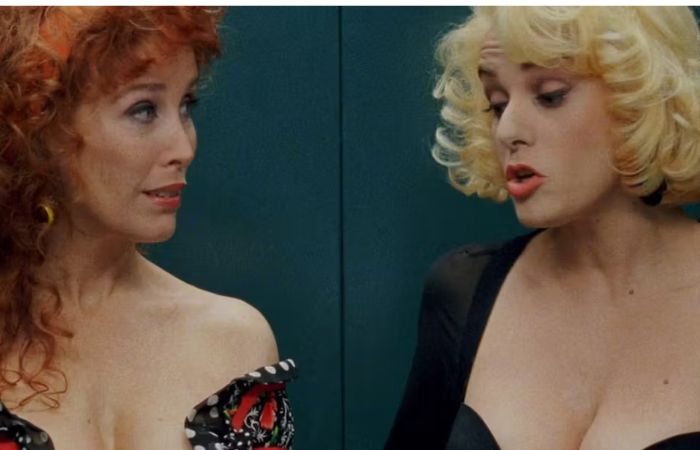
Kika is a 1993 black comedy written and directed by Pedro Almodóvar and starring Verónica Forqué as the title character. Forqué won the Goya Award for Best Actress, the second female protagonist in an Almodóvar film to do so. When Nicholas (Peter Coyote), a famous American author, brings in a cosmetologist named Kika (Verónica Forqué) to prepare the corpse of his recently deceased son, Ramon (Alex Casanovas), Kika inadvertently revives the young man, then falls in love with him. Forces conspire against the couple, though, as Nicholas wants Kika for himself. Kika also must contend with the fact that her maid is sheltering her convict brother in her apartment while tabloid TV show “Today’s Worst” covers her romance.
11. The Flower of My Secret (1995)
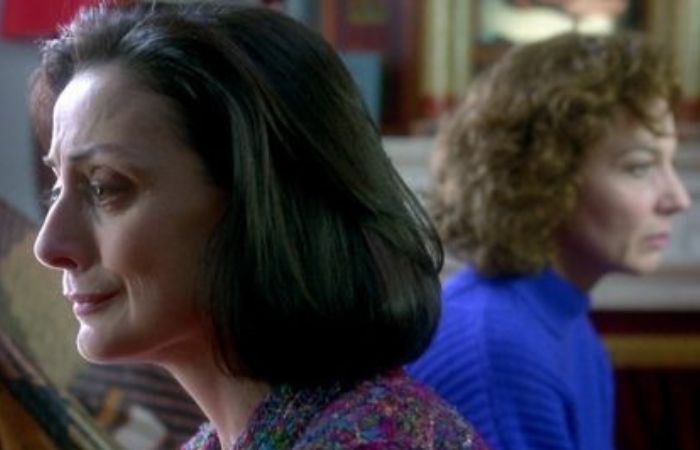
The Flower of My Secret (Spanish: La flor de mi secreto) is a 1995 drama written and directed by Pedro Almodóvar. It was selected as the Spanish entry for the Best Foreign Language Film category at the 68th Academy Awards, but it was not selected as one of the final five nominees. A Spanish writer who pens romance novels as Amanda Gris, Leo Macias (Marisa Paredes) is successful, but unlucky in her own love life. With her solider husband, Paco (Imanol Arias), increasingly distant, both literally and figuratively, Leo tries to fill the void in her life by reevaluating her writing, which leads to an unexpected relationship with Angel (Juan Echanove), a sensitive newspaper editor. Helmed by renowned filmmaker Pedro Almodovar, the movie features a mix of comedy and melodrama.
12. Live Flesh (1997)

Live Flesh (Spanish: Carne trémula) is a 1997 erotic romantic thriller drama written and directed by Pedro Almodóvar, based on the 1986 novel of the same name by English author Ruth Rendell. The film stars Javier Bardem, Francesca Neri, Liberto Rabal, Ángela Molina and José Sancho, with Penélope Cruz and Pilar Bardem. Live Flesh surveys the fallout from an act of violence with a mature melodrama that sees Pedro Almodóvar working in surprisingly restrained form.
13. All About My Mother (1999)
All About My Mother (Spanish: Todo sobre mi madre) is a 1999 comedy-drama written and directed by Pedro Almodóvar, and starring Cecilia Roth, Marisa Paredes, Candela Peña, Antonia San Juan, Penélope Cruz, Rosa Maria Sardà, and Fernando Fernán Gómez. Almodovar has always been famous for his female characters, and “All About My Mother” features one of his richest assortments of women protagonists. All About My Mother deals with complex issues such as AIDS, gender identity, homosexuality, faith, and existentialism. A stellar lineup of Almodóvar favourites (Cruz, Roth, Marisa Paredes) operating at full throttle makes this the sort of lush, femme-centric melodrama about a bereaved woman becomes a surrogate mother to an actor, junkie, pregnant nun and cross-dressing sex worker. The film was a commercial and critical success internationally, winning the Oscar for Best Foreign Language Film in addition to the Golden Globe for Best Foreign Language Film and the BAFTA Awards for Best Film Not in the English Language and Best Direction (Almodóvar).
Watch Almodóvar’s All About My Mother at Angelika Anywhere
14. Talk to Her (2002)

Talk To Her (Spanish: Hable Con Ella) is a 2002 Spanish psychological melodrama written and directed by Pedro Almodóvar, and starring Javier Cámara, Darío Grandinetti, Leonor Watling, Geraldine Chaplin, and Rosário Flores. The film follows two men who form an unlikely friendship as they care for two women who are both in comas. The film was a widespread critical and commercial success, with singled-out praise towards its direction, performances and especially its screenplay, winning the BAFTA for Best Film Not in the English Language and the Golden Globe for Best Foreign Language Film while Almodóvar won the Academy Award for Best Original Screenplay, marking one of the few times where a non-English speaking film won this category. It is generally regarded as one of the best films of the 2000s, one of the best films of the 21st century, as well as Almodóvar’s magnum opus.
15. Bad Education (2004)

Bad Education (Spanish: La mala educación, also meaning ‘bad manners’) is a 2004 Spanish drama written and directed by Pedro Almodóvar. Starring Gael García Bernal, Fele Martínez, Daniel Giménez Cacho, Lluís Homar and Francisco Boira, the film focuses on two reunited childhood friends and lovers caught up in a stylized murder mystery. The metafictional film uses a deeply-nested narrative plot structure to explore themes of gender fluidity, drug use, rape, and sexual abuse by Catholic priests. The film received critical acclaim, and was seen as a return to Almodovar’s dark stage, placing it alongside films such as Matador (1986) and Law of Desire (1987). While its key takeaways surrounding corruption in the Catholic church, molestation, trauma, and all manner of nasty business are deeply cynical, “Bad Education” is optimistic about the power of the movies.
Watch Almodóvar’s Bad Education at Angelika Anywhere
16. Volver (2006)

Volver (Spanish pronunciation: bolˈβeɾ, meaning “to go back”) is a 2006 Spanish comedy-drama written and directed by Pedro Almodóvar. The film features an ensemble cast that includes Penélope Cruz, Carmen Maura (in her first Almodóvar film for 18 years), Lola Dueñas, Blanca Portillo, Yohana Cobo, and Chus Lampreave. Revolving around an eccentric family of women from a wind-swept region south of Madrid, Penélope Cruz stars as Raimunda, a working-class woman forced to go to great lengths to protect her 14-year-old daughter Paula. To top off the family crisis, her mother Irene returns from the dead to tie up loose ends.
17. Broken Embraces (2009)

Broken Embraces (Spanish: Los abrazos rotos) is a 2009 Spanish film written, produced, and directed by Pedro Almodóvar. Led by an ensemble cast consisting of many Almodóvar regulars, it stars Lluís Homar as a blind writer who recalls his tragic love for Lena, played by Penélope Cruz, the deceased lead actress in his last directional feature Girls and Suitcases. Broken Embraces was one of the films competing for the Palme d’Or at the 2009 Cannes Film Festival. Dubbed “purest Almodóvar” by The New Yorker, the film was noted for the director’s characteristic “bright primary colors,” erotic subject matter, and meticulous, “visually pulsating” cinematography.
18. The Skin I Live In (2011)
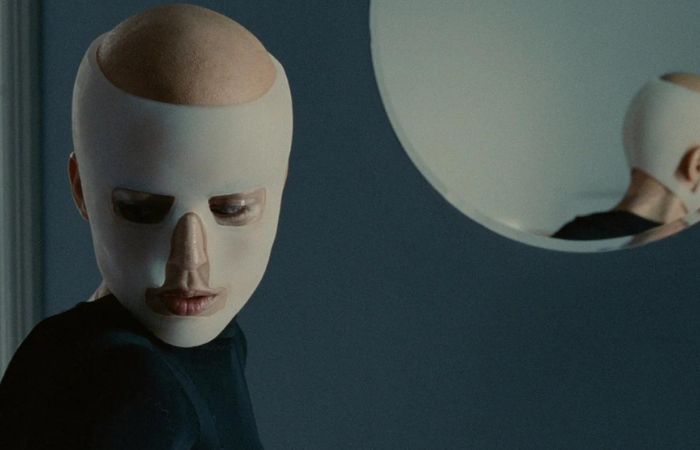
The Skin I Live In (Spanish: La piel que habito) is a 2011 Spanish thriller and melodrama hybrid film written and directed by Pedro Almodóvar, starring Antonio Banderas, Elena Anaya, Marisa Paredes, Jan Cornet and Roberto Álamo, and is his first true foray into the horror genre. It is based on Thierry Jonquet’s 1984 novel Mygale under the title Tarantula, and follows the story of a brilliant plastic surgeon who, haunted by past tragedies, creates a type of synthetic skin that withstands any kind of damage. His guinea pig: a mysterious and volatile woman who holds the key to his obsession.Almodóvar has described the film as “a horror story without screams or frights”.
19. I’m So Excited! (2013)

I’m So Excited! is a 2013 Spanish comedy written and directed by Pedro Almodóvar, and starring Javier Cámara, Cecilia Roth, Lola Dueñas, and Raúl Arévalo. Its original Spanish title, Los amantes pasajeros, has the double meaning of “The fleeting lovers” and “The passenger lovers”. When it appears as though the end is in sight, the pilots, flight crew, and passengers of a plane heading to Mexico City look to forget the anguish of the moment and face the greatest danger, which we carry within ourselves. Almodóvar describes it as “a light, very light comedy”.
20. Julieta (2016)
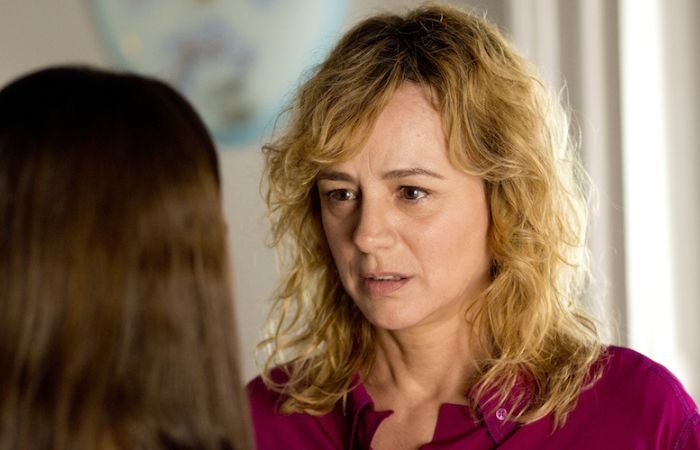
Julieta is a 2016 Spanish melodrama written and directed by Pedro Almodóvar based on “Chance”, “Silence” and “Soon”, three short stories from the 2004 book Runaway by Alice Munro. The film is Almodóvar’s 20th feature and stars Emma Suárez and Adriana Ugarte as older and younger versions of the film’s protagonist, Julieta, alongside Daniel Grao, Inma Cuesta, Darío Grandinetti, Michelle Jenner and Rossy de Palma. The film made its international debut at the 2016 Cannes Film Festival, where it was selected to compete for the Palme d’Or, and was released across the world throughout the remainder of 2016.
21. Pain and Glory (2019)
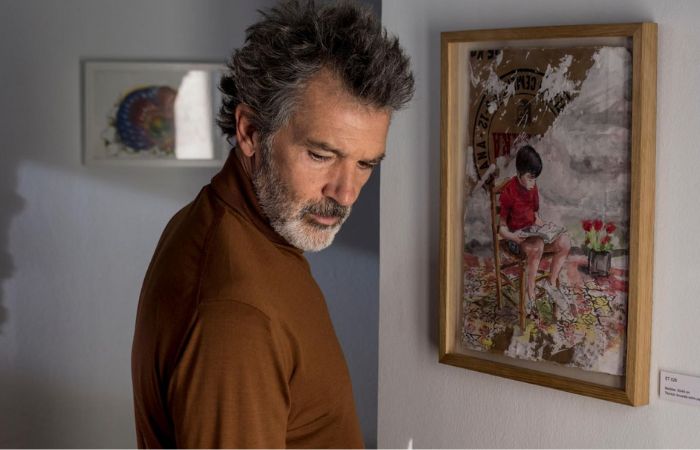
Pain and Glory (Spanish: Dolor y gloria) is a 2019 Spanish drama written and directed by Pedro Almodóvar, in part inspired by his own life. Antonio Banderas stars alongside Asier Etxeandia, Leonardo Sbaraglia, Nora Navas, Julieta Serrano, and Penélope Cruz. The film made its international debut at the 2019 Cannes Film Festival, where it competed for the Palme d’Or and won two awards: Banderas for Best Actor and Alberto Iglesias for Best Soundtrack. At the 92nd Academy Awards, Pain and Glory was nominated for Best International Feature Film,and Banderas was nominated for Best Actor. Time magazine chose the film as the best movie of 2019.
22. Parallel Mothers (2021)

Parallel Mothers (Spanish: Madres paralelas) is a 2021 Spanish drama written and directed by Pedro Almodóvar. The film stars Penélope Cruz and Milena Smit as the two mothers, and features Aitana Sánchez-Gijón, Israel Elejalde, Julieta Serrano and Rossy de Palma. The film had its premiere as the opening film of the 78th Venice International Film Festival on 1 September 2021 where Cruz was awarded the Volpi Cup for Best Actress. It was released theatrically in Spain on 8 October 2021 by Sony Pictures Releasing International. It was also the closing film of the 2021 New York Film Festival on the same day. The film earned two nominations at the 94th Academy Awards for Best Actress (Cruz) and Best Original Score (Iglesias).
Pedro Almodóvar is also widely renowned for his artful short films, including The Human Voice (2020) and Strange Way of Life (2023), which were his first English-language short films and were both critically acclaimed.
Celebrate Pedro Almodóvar’s Legacy
Pedro Almodóvar’s influence extends far beyond the borders of Spain. His films have garnered international acclaim, earning prestigious awards and accolades for their innovative storytelling and artistic merit. Through his own production company, El Deseo, Almodóvar has nurtured talent and supported daring projects that challenge conventions and broaden the scope of what cinema can achieve. His work can often be found in the syllabi for film schools for his iconic visions and auteur style, deeply admired by those who study filmmaking.
Pedro Almodóvar stands as a visionary filmmaker whose works continue to captivate and inspire audiences worldwide. Whether exploring the complexities of human relationships or pushing the boundaries of narrative structure, Almodóvar’s films are a testament to his artistic vision and enduring impact on the world of cinema.
As we celebrate his contributions to filmmaking, we recognize Pedro Almodóvar not only as a director but as a storyteller whose voice resonates with authenticity, empathy, and boundless creativity.




